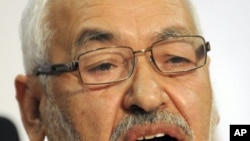Tunisia's revolution has exploded longstanding curbs to free expression. Media, civil society groups and political parties are flowering.
Journalist and blogger Haythem el Mekki, 29, earns a living poking fun at politicians for Tunisia's popular Radio Mosaique. It is the kind of free-wheeling satire that did not exist here a year ago.
During the marathon presidencies of former dictator Zine el Abidine Ben Ali and his predecessor, Habib Bourguiba, Tunisian media was censored, human rights activists were hounded, and many people were afraid to speak their minds. Many who did ended up in prison, including members of the moderate Islamist Ennahdha Party, which emerged as the winner of last week's election.
El Mekki counts among the young bloggers who drove Tunisia's January revolution that ousted Ben Ali.
"If somewhere there was a demonstration in my town, I made videos, I uploaded them on the Internet, it is stuff like this," said El Mekki. "But I did not write a single world about revolution on my blog. The bloggers of the revolution which all the media talks about are just people who reported about the revolution on social media."
Today, the options for free expression have exploded. Dozens of political parties and civil society groups have formed. Even the state media now criticizes the government.
A survey by Human Rights Watch found all the parties running for the elections were committed to free expression. But as regional deputy director Eric Goldstein notes, with caveats.
"If you press them on issues like defamation of religion," said Golstein, "if you press them on whether a Christian has the right to stand on the street and urge people to convert to Islam, there is not as much unanimity on that."
Several incidents this year, including attacks on a synagogue and two movies considered to denigrate Islam, are raising fears of a new religious censorship in this once staunchly secular nation. Earlier this month, a small group of Islamist radicals attacked the private Nessma TV station after it broadcast animated movie Persepolis. They took issue, in particular, with its depiction of God.
Nessma's head Nabil Karaoui describes the attack as a shock, but cautions against reading to much into it. Others believe the Western media has hyped up the incident.
"I want to think that it was very special because of the elections and now the situation will be more calm and more normal and I hope that we will continue to find a way with this new constitution protections for media because because [there is] no democracy without free media," he said.
But the attacks are raising new concerns about political Islam, particularly with Ennahdha's strong show in the polls. Spokeswoman Yusra Ghannouchi says the party is committed to free expression.
"Freedom of the media as well, and artistic creativity," she said. "And at the same time, people may express their opinion whether or not they agree with what is shown, as long as it is within the law and using peaceful means."
El Mekki worries about another kind of censorship. Businesses stop advertising in media that criticize them. Sports fans are outraged when their teams get negative coverage. He believes Tunisia's new freedoms have bred intolerance.
"It is just like Ben Ali left and left us with about 10 million Ben Alis," said El Mekki. "Everyone is trying to set up his rules and make himself command control everything. Everyone wants to have the authority, everyone wants to be the new dictator."
El Mekki hopes the new government, and ordinary Tunisians, will stay true to the principles of the January revolution - a demand for dignity and freedom.
Related story by JulieAnn McKellogg:




